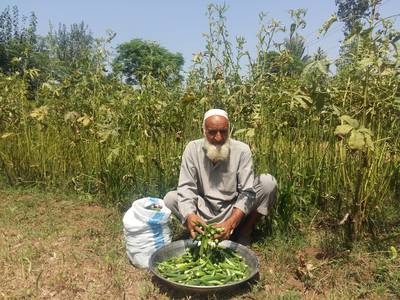ISLAMABAD: Integrated farming offers Pakistan – an under-developed agricultural country – the solution to maximize output from the farming outcrop and value-added products, reports WealthPK.
Compared with conventional or organic farming, integrated farming requires less energy and input cost (including all types of fertilizers and medicinal sprays by enhancing soil immunity).
Harmonized joint management of livestock, water, land, vegetation, livestock, fodder security, and human resource make integrated farming an ideal farming practice. It provides superb socio-economic benefits and is environment-friendly as well.
Talking to WealthPK, Chaudhary Farms, Layyah farmer and owner Ch Basharat Ali, who has adopted integrated farming, said, “A farmer must not be a pauper. Integrated farming helps him in generating more income through a variety of raw and value-added products. Most of the farmers do not have large farmlands. Mostly, they possess an area of around 322,017-430,556 square feet. Usually, a farmer invests a great part of his income to raise another crop. I also own 54,450 square feet. To make this limited area a highly productive unit, my research led me to integrated farming where the farming chains support each other and every farm waste can be turned into an economic unit.”
Explaining, he said dung could be used to produce biogas, fertilizers, and also a nursery to raise manure worms. These worms could be further used as food for birds like hens, ducks, etc, he added.
“The cuttings from the established fruit plants or other income-generating flora can be used to raise a nursery. Following this pattern, after an effort of two to three years, I successfully established three farms i.e., a flock of 100 hens, a mixed herd of sheep and goats with 35 animals, and an orchard of different fruits. In the coming three years, a nursery of about 4,000 to 5,000 plants will also be raised from these cuttings. By next October, 100 to 150 animals will be available for sale. By next year, the sale of each animal will generate a smart income of Rs30,000-40,000 after every four to five months.”
Continuing the discussion, Basharat shared that daily 15kgs of animal waste was collected from his livestock farms. He has established a few compounds of L22×W16 and H4 to prepare the heap and red wiggler composts. From each compound, 600 bags of 40kg fertilizer are produced. Each bag of heap compost and red wiggler sells for Rs1,050 and Rs1,500 respectively. With sundried zero moisture, the shelf life of this organic fertilizer is long-lasting. The liquid collected from the compost compounds can also be used as fertilizer.
Production of red wiggler earthworms is another product of the compost compounds. Basharat not only uses them to feed his birds and to produce compost, but also sells them. He is determined to establish about 32 more farms of different things i.e., mushrooms, snails, honeybees, etc at his limited place along with the value addition units.
Sharing his integrated farming experience with WealthPK, instructor of floriculture at the Agricultural Department, Punjab Naveed Ahmad said right now he was successfully carrying on integrated farming in an area of about 50 acres in Talagang district. He grows traditional crops like wheat, sesame, pulses, peanuts, fodder, etc. The area has a fruit orchard, olive plants, and mixed herd of about 200 sheep and goats.
“Here, we do mulching and make dry fodder and compost from the farm waste. We cultivate the local red wheat variety. When it is 6 to 7 inches high during October through December, it is used for grazing or as fodder during November and December. In April, it’s again ready to harvest. From this experiment, I can say that integrated farming is the best model to follow, but I can comment in a better way in this regard after a trial of 2 to 3 years more,” Naveed said.
It is important to educate Pakistani farmers to adopt better and modern farming practices. Social media campaigns at the government level can also help a lot in this regard.





